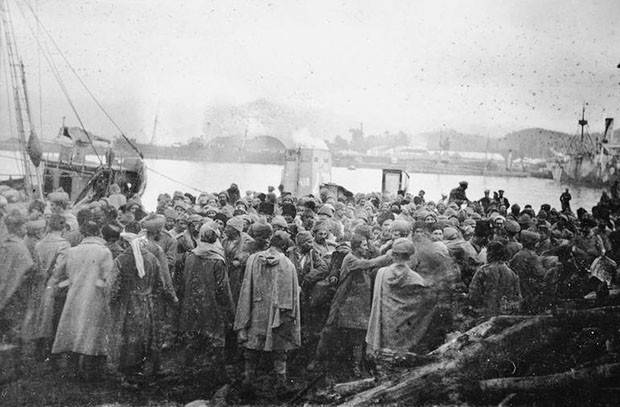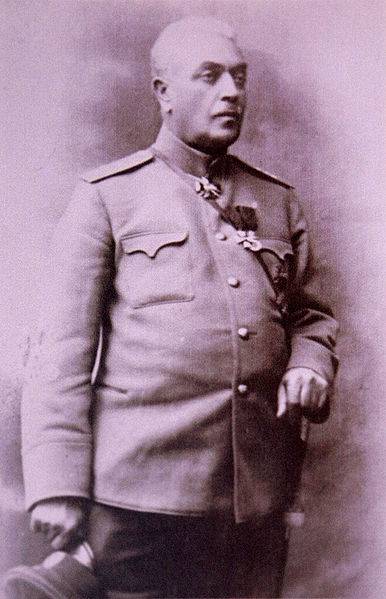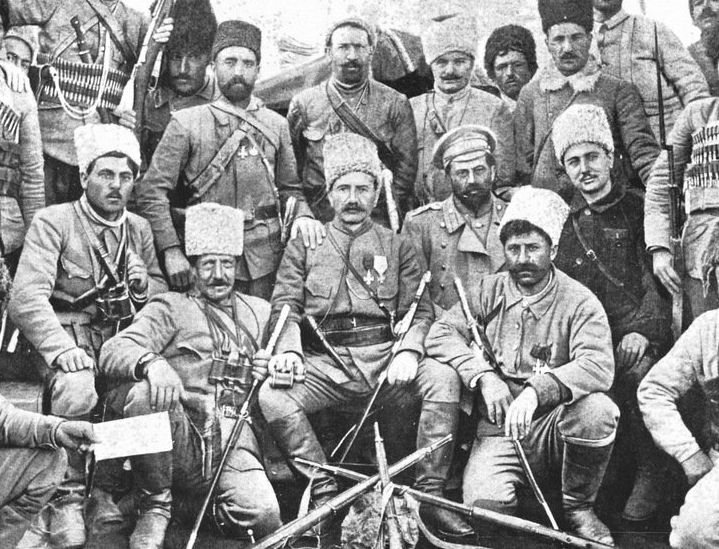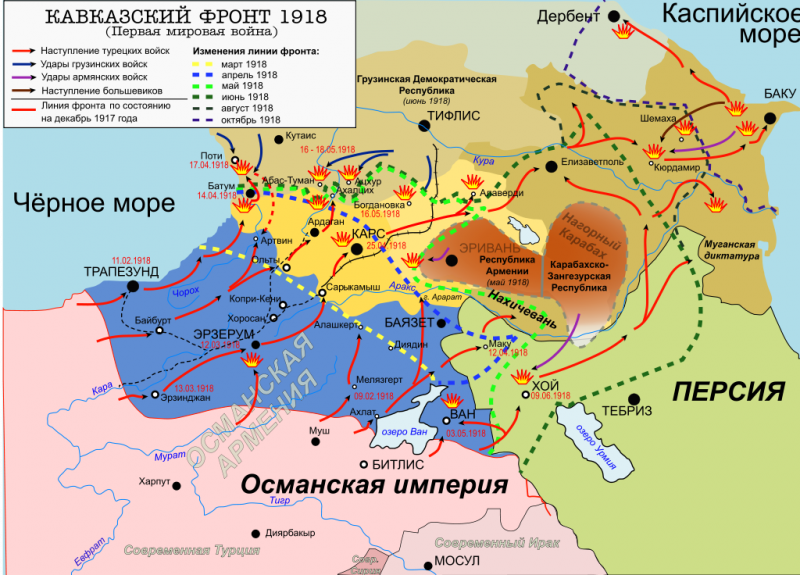Turkish invasion of Transcaucasia. “Thousands of Russians were shot and burned alive. Armenians are subjected to indescribable torture”

100 years ago, in February 1918, the Turkish army launched an offensive in the Caucasus. The Russian Caucasian front has already collapsed and could not stop the enemy. The Turks quickly occupied the previously lost territories, captured by Russian troops in the cruel and bloody battles of 1914 – 1916. Resistance to the Turkish troops was provided mainly by Armenian troops. For Armenians, the arrival of the Turkish army meant a terrible death or slavery.
prehistory
The 1916 campaign of the year ended victoriously for the Russian army in the Caucasus. Russian troops advanced deep into the Ottoman Empire, taking possession of the most important and largest cities: Erzerum, Trabzon, Van, Erzincan and Bitlis. Russian troops captured almost all of Western Armenia. Turkish counterstrikes were repulsed. With the successful conclusion of the war for Russia, the conquered territory could have become part of it. Thus, the Armenian issue was solved - the whole of Armenia and the Armenian people were completely freed from the Ottoman yoke, uniting under the authority of the Russian Tsar.
It is worth noting that since the fall of 1916, the commander of the Caucasian army of Grand Duke Nikolai Nikolayevich was not so much concerned with military affairs, as with intrigues over a possible palace coup in Petrograd. To him came the leaders of the masons from Petrograd and Moscow, who made the Grand Duke very flattering suggestions: he could again become the Supreme Commander of the Russian army, or even Emperor Nicholas III. It is not surprising that during the “general plebiscite” organized by 2 in March 1917 by General Alekseev, Nikolai Nikolayevich spoke in favor of Tsar Nicholas II’s abdication and immediately left for GHQ, leaving the Caucasian army. Nikolai Nikolayevich was making rainbow plans, but he miscalculated. The Freemason masons deceived him, and on the way he received an order from the Provisional Government, by which he was completely deprived of all posts in the Russian army.
In the winter of 1916 - 1917, a positional lull set in on the Caucasian front. The harsh winter in the mountains and the lack of developed communications made the fighting difficult. The Russian Caucasian Army and the Black Sea Fleet during the 1917 campaign of the year could solve the strategic tasks of seizing Constantinople and the straits, completely defeating Turkey, and joining the Russian regions of the Ottoman Empire to Russia.
The February Revolution destroyed all the brilliant results of the battles of 1914 - 1916. The new commander of the Caucasian front, N. N. Yudenich (he had previously been the de facto commander of the army) tried to continue offensive operations against the Turks. But the difficulties with the supply of troops against the background of economic collapse in the country and disorganization of the rear, the fall of discipline under the influence of revolutionary agitation and an increase in the incidence of malaria forced him to stop the Mesopotamian operation and withdraw the troops to mountainous areas. Refusing to comply with the order of the Provisional Government to resume the offensive, 31 May Yudenich was removed from the command of the front. The troops were led by General M. A. Przhevalsky. However, he could not change the overall situation in the country and the army. During 1917, the Russian army was dying, the soldiers deserted, going home, and by the end of the year the Caucasian front was completely destroyed. Considering that it is impossible to continue the leadership of the troops of the Caucasian Front in this situation, General Przhevalsky 28 December 1917 of the year resigned as Commander-in-Chief and left the active army, transferring command of the Chief of Staff of the Front to General E. V. Lebedinsky.
15 (28) November 1917 by Mensheviks, Socialist-Revolutionaries, Dashnaks (Dashnaktsutyun - Armenian political party) and Musavatists (from the word "Musavat" - Azerbaijani Nationalist Party) in Tiflis, the Transcaucasian Commissariat is created. In fact, it was the nationalist government of Transcaucasia (Azerbaijan, Armenia and Georgia). In relation to the Soviet government, the Transcaucasian Commissariat took an openly hostile position, supporting all the anti-Bolshevik forces of the North Caucasus - in the Kuban, the Don, the Terek and in Dagestan. The Transcaucasian Commissariat began to disarm the revolutionary-minded parts of the Caucasian army and, relying on national armed groups, extended its power to all of Transcaucasia, except for the Baku region, where Soviet power was established.
The declaration of the Transcaucasian Commissariat of November 18 (December 1) indicated that it would act "only until the All-Russian Constituent Assembly is convened, and if it is impossible to convene ... until the Congress of the Constituent Assembly members from the Transcaucasus and the Caucasus Front." After the Bolsheviks broke up the Constituent Assembly, the Transcaucasian Commissariat decided to convene the Transcaucasian Sejm as a legislative body of the Transcaucasus. 10 (23) February 1918 was held in Tiflis, the first meeting of the Sejm. Its chairman was the Georgian Social Democrat (Menshevik), one of the prominent revolutionaries of Februaryites N. S. Chkheidze. The Georgian Mensheviks — Cheidze, Chkhenkeli, and Jordania — took leading positions. They planned to create an “independent” Georgia under the protectorate of Germany. Azerbaijani nationalists were preparing to go under Turkey. Armenian dashnaks were also eager for independence, but they clearly understood that they were not enough to defend her. The British and the French are far away, and the people are connected with the Russian by many threads. Therefore, in general, adhered to the pro-Russian orientation.
5 (18) December 1917 between the Russian and Turkish troops was concluded the so-called Erzincan truce. The fighting in Asia Minor and Persia was suspended tentatively until February 12 1918. For the final peace treaty with Russia, the Ottoman Empire sent its delegation to Brest-Litovsk. As a result, there was a massive retreat of the remaining Russian troops from Western (Turkish) Armenia to the territory of Russia. The front, which was still standing by inertia, was in fact no longer held by anyone.
Armenian building
In order to somehow compensate for the collapse of the army, the formation of national units intensified. By the middle of July, 1917, on the Caucasian front, at the suggestion of the Armenian public organizations of St. Petersburg and Tiflis, Armenian separate battalions (previously detachments) were transformed into 6 Armenian regiments. By October 1917, the 2 Armenian divisions were already operating here. In December 1917 of the year, the Armenian Voluntary Corps was formed. Lieutenant-General F. I. Nazarbekov was appointed its commander. Thomas I. Nazarbekov had great military experience, he participated in the war 1877 - 1878. In World War I, he commanded a brigade, division, Azerbaijan-Van detachment, 2-m Caucasian Rifle Corps and 7-m separate Caucasian Corps, operating as part of the Russian troops in Persia.
Evgeny Evgenievich Vyshinsky became the Chief of Staff of the Armenian Corps. During World War I, he commanded the 13-m Erivan regiment of the Caucasian Grenadier Division, was the duty general of the headquarters of the Caucasian army, later an assistant to the quartermaster general of the Caucasian army and chief of staff of the Caucasian army. The Armenian corps consisted of 1 and 2 divisions, a horse brigade and several separate regiments. Also included in the corps was a Special Impact Division (Western Armenian Division) formed by order of Przhevalsky under the command of Andranik Ozanyan. In addition to the Armenians, the division also included Russian soldiers and officers (mostly Cossacks), Greeks, Assyrians, and Yezidis.
Andranik Torosovich Ozanyan was a very interesting person. Born in Turkey. Participated in the Armenian national liberation movement, led by partisans (Haiduk) in Western Armenia. In the 1904 year, after the suppression of the Sasun self-defense by the Turks (one of the major Armenian uprisings against the Ottoman yoke), Andranik left Western Armenia. Having visited Persia, Baku and Tiflis and established contacts with the leaders of the Armenian national movement, he went to Europe, where he was engaged in advocacy activities in support of the Armenians. In the 1912 year, with the start of the First Balkan War, Andranik participated in the formation of an Armenian company. For participation in the war against Turkey, Andranik received Bulgarian citizenship and the rank of officer in 1913. When the world war began, Andranik went to the Caucasus, where he formed and led the first voluntary Armenian squad. The brigade distinguished itself in the composition of the Russian troops of the Caucasian army in the battles for the capture of Van, Bitlis, Mush, in the battle of Dilman. In 1916 - 1917 Andranik organized assistance for Armenian refugees, took part in the I Congress of Western Armenians, and organized the publication of the “Hayastan” newspaper, which advocated consolidation of the forces of Eastern and Western Armenians.
It is worth noting that Andranik well understood the significance of the Russian factor in the Caucasus. In one of the interviews he said: “Caucasian peoples should treat the Russian people with understanding, taking into account that the Russian soldier protected them from the invasion of the barbarians. Ganja incident leads to sad reflections. It is wrong to treat the sons of Russia, who shed their blood in our mountains for three years of struggle. The Russian people should not turn their backs on the traditional course of their fathers, forget the blood shed by their fathers and grandfathers in the Caucasus Mountains to oblivion ... All-Russian statehood should be preserved in the Caucasus ... ”
Thus, by the beginning of 1918, the Turkish army was actually opposed by only a few thousand Caucasian (mostly Armenian) volunteers under the command of a certain number of officers of the old Russian army.

Thomas I. Nazarbekov (1855 - 1931)

Andranik (center) during the First World War
Turkish offensive
The position of the Ottoman Empire in 1917 was similar to the situation in Russia. The war completely undermined and so flimsy position of the empire. All of the country's economy - industry, agriculture, finance, trade, was collapsed. The common people were starving. Officials, the bourgeois stratum, could have enriched themselves as much as possible - by staging a "feast during the plague." The Young Turkic ruling elite set the tone for the shameless robbery of the country. The head of the ruling triumvirate Enver Pasha was especially distinguished in this. During the war, he managed to acquire several palaces at the expense of the treasury and in general did not refuse anything to himself. Other Turkish dignitaries also behaved. And this is against the background of the approach of the complete collapse of the Turkish Empire.
In the Caucasus, in Mesopotamia and Palestine, the Turkish army suffered defeats. Desertion has taken incredible proportions. Troops sent to the front in the spring of 1917, lost on the way to the theater of operations, up to 40% of the personnel. In addition, there were a lot of cases of self-harm and suicide in the army. Deserters often created bandit formations, or national units that fought against the Turks in response to the policy of genocide against national and religious minorities (Armenians, Greeks, Yezidis, etc.). This aggravated the chaos in the country. Struggling with desertion and Chetnik partisans, the Turkish authorities showed even greater brutality, punitive wiped out whole villages and villages.
In the spring of 1917, the British took Baghdad and launched an offensive in Palestine. In November - December 1917, the British army captured Gaza, Jaffa and Jerusalem. On the Caucasian front, for the most part of 1917, the Russian army retained an advantage. The revolution in Russia has changed the situation in the Caucasus radically. Tens of thousands of soldiers left the position and moved home. Russian front collapsed. However, the rulers of Turkey, instead of reinforcing the troops in Mesopotamia and Palestine, preferred a new military adventure - the invasion of Transcaucasia. The Turkish elite, despite the degradation of the army, which was retreating under the onslaught of the British, and the complete collapse in the country, was still delirious by the conquest of the Caucasus. And this is at the moment when the Turkish army lost hundreds of thousands of people, and the country lost a large part of the territory - Hijaz, Southern Palestine and most of Iraq.
30 January (12 February) 1918, Turkish troops under the command of 3 Army Commander Vehiba Pasha, violating the conditions of the Erzincan Armistice, launched a large-scale offensive on the Erzurum, Van and Maritime directions. The attack involved up to 10 Turkish divisions, Kurdish cavalry and Muslim militia units. Almost immediately, they were busy with Erzincan, February 4 - Bayburt, February 8 - Memahatun, and February 11 (24) - Trabzon. They moved relatively calmly, since the Russian army was no longer there. Only detachments of Armenian nationalists tried to bring down the rate of the enemy offensive.
A massacre typical of the Turkish invasion began. They cut out the remaining rear Russian institutions, hospitals that did not have time to leave. They robbed, raped and brutally killed Armenian refugees, who had just returned to their native lands, relying on the protection of the Russian army. German diplomats reported that to Trapezund “thousands of Russians were shot and burned alive. Armenians are subjected to indescribable torture. Children are thrown into bags and thrown into the sea, old men and women are nailed to crosses and crippled, and girls and women are raped. ” Greece now fought on the side of the Entente, and therefore the Greek community was mercilessly massacred. Their quarters were trashed, men were shot and killed by children, women and girls were raped, brutally abused. Turkish authorities demanded total extermination of Armenians. The genocide of 1915 of the year was continued.
Map source: https://ru.wikipedia.org/
In the meantime, a discussion was going on in the Transcaucasian Seym: what should be done? The Armenian (Dashnak) faction proposed to leave Transcaucasia as part of Russia on the rights of autonomy, divided into national cantons, and in relations with Turkey - to insist on self-determination of Western Armenia. The Muslim (Azerbaijani) delegation declared that the Transcaucasus should decide its fate independently of Russia, concluding peace with Turkey on the basis of refusing to interfere in its internal affairs. The Georgian faction mainly supported the Muslims on the issue of declaring the independence of Transcaucasia and the conclusion of an independent treaty with Turkey. In connection with the stubbornness of the Armenians, the question of the declaration of independence was temporarily postponed. With Turkey, they decided to try to conclude peace on the basis of preserving the twin borders (1914 of the year). The question of the autonomy of Western Armenia within Turkey was also raised.
Local politicians spent more time chattering, although initially there were conditions for creating a strong army and repelling the enemy invasion. So, it was decided to create a new Caucasian army in the Georgian, Armenian, Muslim and Russian corps, the Greek division and the Assyrian regiment. In the Transcaucasus there were huge warehouses of the Russian front: weapon, ammunition, ammunition, various materials. The Russian soldiers, leaving, threw a lot of weapons, some were taken away by local residents. Local residents returned from various fronts: with combat experience, weapons. Part of the Russian officers remained, and could become the backbone of the new army. With a general mobilization, the Transcaucasus could have deployed a large army. Given the general weakness of the Turkish army, its decomposition and the presence of strong positions in the mountains, already fortified by the Russian army, the existing fortresses, it was possible to repel the enemy strike. However, the government of the Caucasian nationalists preferred to chat and squabble for power, and did not take decisive measures to repel Turkish intervention. In addition, Armenians, Georgians and Muslims had their own vision of the future of Transcaucasia. There was no unity even in the ranks of the largest nations. Thus, the Georgian Muslims supported the Turkish offensive.
Meanwhile, the Turkish troops 21 February (6 March) took Ardahan, 27 February (12 March) began the retreat of the Armenian forces and refugees from Erzerum. February 29 (March 14) Turks took Erzerum. Thus, the Turks recaptured the entire territory occupied by the Russians in the First World War. All the works and the blood of Russian soldiers were in vain.
From 12 March to 13, April 1918, negotiations were held between representatives of the Transcaucasian Seym and the Ottoman Empire in Trabzon. Representatives of the Seimas insisted on returning to the borders of 1914 of the year and self-determination of Eastern Anatolia (Western Armenia). The Turks demanded recognition of the Brest-Litovsk peace treaty, according to which Batumi, Kars and Ardahan, as well as the territories of the Transcaucasus occupied by Turkey since the outbreak of hostilities, were to be recognized as part of the Ottoman Empire. The Armenian and Georgian delegations were against accepting these requirements. However, the Azerbaijani (Muslim) delegation was willing to accept them, since the disputed territories did not belong to them and Pan-Turkist sentiments prevailed among the Azerbaijani delegates. As a result, the Sejm interrupted the negotiations and withdrew the delegation from Trebizond, officially entering the war with Turkey. At the same time, representatives of the Azerbaijani faction in the Seimas openly declared that they would not participate in the war against Turkey, given their "special religious ties with Turkey."
The Transcaucasian government could not fight with Turkey. The Caucasian army remained on paper. The Georgian corps never began to form, the Georgian Social Democrats hoped for the support of Germany. Instead of army units, the People's Guard began to be formed in order to crush the Abkhaz, Adzharians, Ossetians, Lezgins and expand the borders of the future Georgian “state”. At the same time, in order to please Germany, they began to pursue an anti-Russian policy, massively dismissing Russian officers and officials, whose families often became victims of local gangsters. Azerbaijani nationalists formed their troops, but planned to work together with the Turks. To form the Russian corps, the Sejm did not allow. Therefore, only Armenian troops resisted the enemy. But the Armenian corps had too little strength to stop the invasion. In addition, there were many bosses, from whom often came various instructions. Nazarbekov and Andranik called on the people to take up arms, but their initiative was extinguished in endless meetings and talking rooms.
The Turks, inspired by their success, planned not only to restore the borders to the 1877-1878 war, but to go further. 30 March 1918 Turkey presented an ultimatum to the Transcaucasian Committee for the immediate purification of the Kars, Batumi and Ardahan regions. Turkey insisted on restoring the border before the 1877 - 1878 war. Turkish rulers again remembered “Turan” - the great Pan-Turkic empire, they dreamed of breaking through further to the North Caucasus, and then the Volga region, Turkestan! The Turks, with the support of local Muslims, continued the offensive. 1 (14) of April the Turkish army occupies the Batumi fortified area, and by 12 (25) of April Kars and Ardahan.
At the same time, Kars was a powerful fortress that covered the main road to Transcaucasia. Here were located front stocks of weapons, ammunition, equipment. The main forces of the Armenian Corps were concentrated in the fortress and were ready to give the enemy a decisive battle. Nazarbekov rallied troops, put things in order. However, the Ottomans put pressure on the Transcaucasian government and its head Chkhenkeli demanded that Nazarbekov leave the Kars fortress. The military was shocked - how so? Here you could stop the enemy and keep as much as you want! However, they are accustomed to carry out orders. Andranik wrote: “This General (Nazarbekov), who knows how to subordinate everyone to iron discipline, became a toy in the hands of schoolchildren and office scribes.” The Ottomans without a fight and heavy victims received a first-class fortress with hundreds of guns, masses of other weapons and supplies, the key to Transcaucasia. The surrender of the fortress demoralized the remaining fighters, many dropped their weapons and went home.
The Turks entered upon lands that had already forgotten the horrors of long-time invasions. Cut out all the Christians - Armenians, Georgians, Russians, etc. Rezali Yezidis. The peasant population was robbed, burned villages. The roads were filled with refugees. The Soviet government tried to intercede, turned to Germany. It was emphasized that the responsibility for the crimes falls on the Germans, they should have an impact on the allies. Berlin, who had his plans for the Caucasus, was worried. Germany did not need the desert, which left behind the Turkish conquerors. However, the Young Turkish government ignored Berlin, sent diplomatic excuses, and continued to carry out the offensive.
9 (22) of April, despite the resistance of the Armenians (they understood that the new state would be a puppet of Turkey), the Caucasus was proclaimed "an independent, democratic and federal republic." A new peace conference opened in Batum on April 28 (May 11) on April 1918. At the talks, the Turks presented even more difficult conditions than the Brest-Litovsk Treaty provided for. Transcaucasia was to cede to Turkey two thirds of the territory of the Erivan province, Akhaltsikhe and Akhalkalaki counties of the Tiflis province, and also control over the Transcaucasian railway.
Thus, Turkey decided to take advantage of the collapse of the Russian Empire. The Turkish army reclaimed land lost during the 1914 – 1916 hostilities. and continued the offensive in the depths of the Transcaucasus to seize the lands that were ceded to Russia after the 1877 – 1878 war. Moreover, the Turks planned to advance further, putting under their control a large part of the Caucasus. But all these successes were short-term, since the Turkish Empire itself was already on the verge of total collapse.

Information